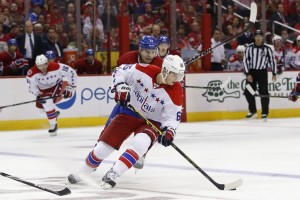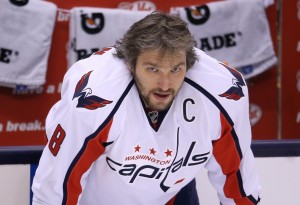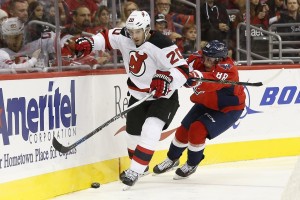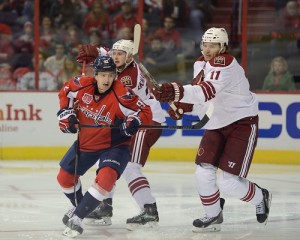
You’re a young player in the Washington Capitals locker room, trying to make a name for yourself at the NHL level. You look around and see superstar-caliber players such as Alexander Ovechkin and Nicklas Backstrom, longtime veterans with strong postseason resumes such as Brooks Orpik and Justin Williams, players who have been heroes on the international stage such as T.J. Oshie and John Carlson and veteran organizational standbys such as Brooks Laich and Jason Chimera.
As you take it all in, suddenly it hits you. These players have one thing in common: They’ve all bought in to the Barry Trotz plan. It took a little time to get the full buy-in, maybe until about time last year during Trotz’ first season at the Caps’ helm, but the results in the win column and on the individual and team stat sheet have been eye-popping over the last calendar year.
A year ago today the Caps were 10-9-4 and finishing up a mediocre 6-6-2 November. They opened December with a loss to Vancouver before rolling to an 8-1-3 mark the rest of the month, which ultimately helped propel them to a 35-16-7 record from December 4 until the season’s final whistle.
That momentum carried them to a seven-game, opening-round playoff victory against the Islanders and within a Joel Ward goalie-interference call of defeating the regular-season champ Rangers and advancing to the team’s first conference final since 1998. In the 12 months since Dec. 1, 2014 Washington has recorded a 52-22-8 regular-season record, which places them among the NHL’s elite during that span and is a Presidents’ Trophy-type pace.
What’s Good for the Goose

From an individual player’s perspective, a quick study of the team’s most visible star, Ovechkin, provides all the evidence necessary to understand the culture Trotz has created and the importance of buying in. While his goal-scoring abilities never were challenged, the pre-Trotz Ovechkin was criticized regularly by hockey pundits for giving an uneven overall effort and in particular for not giving an honest effort in the defensive zone. Some even went so far as to call Ovechkin a “coach killer,” pointing to the short tenure of recent Washington bench bosses Dale Hunter and Adam Oates – as well as the previous dismissal of popular and successful coach Bruce Boudreau.
Some of the criticism flung toward Ovechkin was hard to dismiss following his minus-35 showing, despite topping the 50-goal plateau, in 2013-14. But upon accepting the job in D.C. Trotz made a point to travel to Las Vegas to meet with the Russian star for a face-to-face chat about the perception of Ovechkin around the league. Trotz promised Ovechkin that a better defensive-zone effort would create opportunities on the offensive end and allow him to be on the ice more in crucial late-game situations. He also promised that if he and the others bought in to the culture he was selling, the team’s improvement would be noticeable.
From that point on Trotz claims that Ovechkin was a good solider, never a problem and a joy to coach. He praised the captain openly in the media for his attitude and effort – maybe even before he fully turned the corner – and said that the perception of Ovechkin being uncoachable was entirely false.
Ovechkin returned the favor with a concerted effort to be more defensively responsible, and guess what? He still led the league in goals with 53 and recorded a massive plus-45 turnaround, ending the year at plus-10. Once Ovie bought in and got the results, his teammates fell into place and the Caps have not looked back since. Neither has Ovechkin, who went from a pariah in the eyes of the media to one of the best stories in the NHL and a complete hockey player.
“I use the term beast mode,” Trotz said of Ovechkin recently. “He gets into that beast mode, where he’s the strongest guy and the fastest guy and he’s the man. I like the fact that he’s better defensively. That’s why he’s in late in games. He’s doing a really good job in that area. We have an understanding that if you do it well I’m going to use you in those areas. I think he’s relishing that a little bit and he’s having some production playing with {Backstrom). I think their magic is back a little bit.”
Coach Knows Best

So if I’m Andre Burakovsky or Tom Wilson or Nate Schmidt and I look around and see the impact that Trotz’ wisdom has had on one of the world’s best players, when the boss comes around for a heart to heart or decides that maybe I need to sit out a few games to think about my game a little bit, you can bet I’m going to pay attention. That has happened with each of those three players this season, and their responses provide yet another strong indication that “the culture” has taken hold.
Burakovsky, a talented young forward with top-six skill and ice vision, got off to a fast start last year in his rookie campaign. His talent and offensive hockey sense were evident right from the start, but his strength and willingness to battle came into question as he bounced up and down between Hershey and D.C. before getting a regular shift in the posteseason following an injury to Eric Fehr. Burakovsky finished the year with nine goals and 13 assists to go along with a plus-12 rating in 53 regular-season appearances before recording 1-2-3 in 11 postseason contests.
His late-season and postseason play were impressive enough for both Trotz and General Manager Brian MacLellan to pencil Burakovsky into a second-line wing slot heading into the 2015-16 campaign. And while Burakovsky showed some of that promise at times early on this year, some of the old flaws such as getting outmuscled on the boards and making bad decisions with the puck surfaced as well, prompting Trotz to send him another message by scratching him in back-to-back games.
Burakovsky responed with a solid outing in his first game out of the doghouse, seeing 11-plus minutes of ice time and playing a strong game on and off the puck Nov. 25 vs. Winnipeg. He then turned in his strongest all-around effort of the season Nov. 27, generating four shots on goal and creating several scoring chances, in a 4-2 victory against Tampa Bay. He was back in the lineup the next night in a 4-2 victory at Toronto and was on the ice for about 13 minutes for the second consecutive outing.
“If he makes a mistake, he knows he made the mistake. If he should make a play, he knows he should make a play,” Trotz said of Buarkovsky recently. “Those are indicators that he knows it and is thinking about it. He’s not just blowing it off. Just like growing a player’s game on the ice in terms of giving them more responsibility, going through a tough period when maybe you’re not producing or you don’t feel it – where everything you do is not working well – how do you deal with that? Can you just clear your mind and play and understand what you can and cannot control? That’s part of his game where he’s got to just develop a little bit. He’s very young and he’s going to be a big piece for a very long time. It’s a process.”
Trotz has eased the pressure on Burakovsky a bit, first dropping him to the fourth line, but more recently by having him settle in on the third line alongside veterans Jay Beagle and Jason Chimera. That move has pushed another young forward, bulldozing winger Tom Wilson, back onto the “fourth line.”
Wilson is another player who was touted by Trotz and MacLellan as someone who had a top-six future and who likely would spend this season mostly on the third line. But after some encouraging – and somewhat surprising – signs of creativity and vision in the offensive zone early in the year, Wilson’s offensive contributions dropped off considerably. And clearly his hard-charging, physical game is more suited for the fourth line, while Burakovsky’s more creative style is a better fit on the third line.
Like Burakovsky, though, Wilson has responded from his “demotion” with some of his best performances of the year, including a goal in Saturday’s win at Toronto, prompting Trotz to praise the former first-round pick as more than just your average grinder.
“What I like about our fourth line is that they can really be our third line,” Trotz said of the Wilson, Michael Latta and Brooks Laich trio. “They’re just different from Beagle’s line. Beagle’s line is a tenacious line with a little more speed and skill on it and being able to put pressure on you from a speed aspect and a relentless, determined aspect. The Latta line is a little heavier. They still dog the puck and make you pay a price to get it out of the zone and all that. They’re just a different type of line. They’re sort of like 3A and 3B, whichever way you want to say it.”
Stick to the Plan

Last year Trotz was lauded for his patience in bringing along Burakovsky and budding-superstar Evegeny Kuznetsov, who has turned into one of the league’s most dynamic offensive forces this season. He took the pressure off of them by limiting their minutes, sitting them down, moving them down in the lineup and allowing them to view the game from a different perspective. He seems to be taking a similar approach with Wilson as he grooms the youngster to play a larger role down the road.
“We feel very comfortable putting Tom out on a penalty-kill situation,” Trotz said. “I think a penalty-kill situation forces a young player to have detail and to think about the game a little differently. That’s helped him without screwing up his game. We have a growth pattern for him. Let’s start with the penalty kill then at some point maybe he’s a net-front guy. Maybe it’s not this year. Maybe it’s next year. We want to keep growing his game.
“It’s no different from Burakovsky or Kuznetsov. We have to come up with ways to grow their games. That’s our job and then they’ve got to have the buy-in. I think Tom’s had good buy-in. He’s gotten more minutes, and I think his understanding of the situation and the momentum of the game is much clearer. That’s just the maturation process.”
Another player that Trotz has sent a message to this season is swift-skating Nate Schmidt, who opened the season as the sixth defenseman before finding himself scratched just three games into the campaign. Perhaps the team’s most impressive skater, Schmidt rotated a little bit as the sixth d-man with Taylor Chorney for a while and then got a chance to play with top-paring defenseman John Carlson when Orpik went down with an injury nine games ago.
Since then Schmidt has been a more confident and consistent player, providing sound positional defense in his own end, moving the puck effectively to teammates on the breakout and using his speed to carry the puck out of the zone when necessary. He even has jumped into the rush to create scoring opportunities occasionally. In a recent game against Colorado Schmidt stepped in from the point to snipe a top-corner goal, and he fed Backstrom for a pretty 2-on-1 goal after an end-to-end rush vs. Winnipeg.
Since Orpik went down Schmidt has recorded a goal and two assists and is plus-3 while seeing his ice time rise from about 17 minutes a game to an average of about 20 per contest in the last four outings. He saw a season-high 23 minutes of time against offensive-juggernaut Dallas Nov. 19 and tied his season-high with three shots on goal that night. Schmidt has even seen more time on the penalty kill in Orpik’s absence, and if you believe in analytics such as shot attempts allowed per 60 minutes and scoring attempts allowed per 60 minutes while on the PK, his numbers are better than both Orpik’s and Carlson’s.
“Brooks {Orpik) is a big part of our group – not only on the ice, but off the ice.” Trotz said. “The leadership {he brings}, and he’s a physical presence back there. He’s a big body and a big part of the penalty kill. We miss him, but it’s a good time to develop guys and see what you really have. Guys want opportunities, and the opportunity is there and they’re earning more minutes. We’re not in a panic and wondering who we can call up from Hershey or who can do better. This is the group and we’re going see if they can get it done.”
If Washington’s recent season-best five-game winning streak is any indication, all of the guys – young and old – are getting it done. But don’t let Trotz, the old culture salesman, fool you. The head coach has plenty to do with the Caps getting off to their best start through 23 games in franchise history, and the best news of all for D.C.-area hockey fans is that they still are a work in progress.